List of Nobel Peace Prize Laureates
The Nobel Peace Prize is an award for special merits in peace work. It was donated by the Swedish inventor and industrialist Alfred Nobel . This award has been presented every year since 1901 on the anniversary of Alfred Nobel's death, December 10th, in Oslo.
The Nobel Peace Prize was awarded a total of 134 times up to 2019, of which 90 awards (67.2 percent) went to men, 17 (12.7 percent) to women and 27 (20.1 percent) to organizations. The International Committee of the Red Cross (ICRC) has already been awarded three times (1917, 1944 and 1963) and the Office of the UN High Commissioner for Refugees twice (1954 and 1981). This means that 24 organizations have received at least one Nobel Peace Prize. So far, no one has been awarded repeatedly.
A total of 67 of the Nobel Peace Prizes were awarded in full, of which 51 were awarded to a person and 16 to an organization. A total of 30 times the Nobel Peace Prize was split between several winners, 22 times to two people, twice to two organizations and six times to one person and one organization. Only twice (1994 and 2011) was the prize divided between three people.
List of award winners
This list provides a chronological overview of the Nobel Peace Prize winners . The category Nobel Peace Prize Winners offers an alphabetical overview .
Until 1990, in contrast to the other Nobel Prizes, no official reason was given for the Nobel Peace Prize. Therefore, in the justification for these years, the activity that is assumed to be the cause of the award is noted.
| 1900 • 1910 • 1920 • 1930 • 1940 • 1950 • 1960 • 1970 • 1980 • 1990 • 2000 • 2010 • 2020 |
1900s
| year | person | country | Reason for awarding the prize | image |
|---|---|---|---|---|
| 1901 |
Henry Dunant (1828-1910) |
|
Founder of the International Committee of the Red Cross |
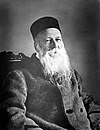
|
|
Frédéric Passy (1822-1912) |
|
Founder of the "French Society of Friends of Peace" (" International Peace League ") |

|
|
| 1902 |
Élie Ducommun (1833–1906) |
|
Head of the Bern International Permanent Peace Office of the " Interparliamentary Union for International Arbitration " |
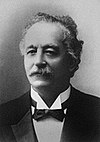
|
|
Albert Gobat (1843-1914) |
|
Head of the Central Office of the " Inter-Parliamentary Union for International Arbitration " |

|
|
| 1903 |
William Randal Cremer (1828-1908) |
|
Founder of the " Inter-Parliamentary Union for International Arbitration " |

|
| 1904 |
Institut de Droit international (founded 1873) |
Based in Ghent, Belgium |
Work of the institute for the further development of international law |
|
| 1905 |
Bertha von Suttner (1843–1914) |
(born in Prague , now the Czech Republic ) |
Her life's work, including the novel Put your arms down! , suggested Nobel presumably to the foundation of the Nobel Peace Prize |

|
| 1906 |
Theodore Roosevelt (1858-1919) |
|
mediated the peace treaty between Russia and Japan in 1905 |
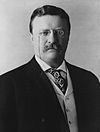
|
| 1907 |
Ernesto Teodoro Moneta (1833-1918) |
(born in Milan , then Austrian Empire ) |
President of the Lombard Peace League |

|
|
Louis Renault (1843-1918) |
|
played a prominent role at various international congresses, in particular the Hague Peace Conferences and the meetings of the Hague Conference on Private International Law |

|
|
| 1908 |
Klas Pontus Arnoldson (1844-1916) |
|
Founder of the Swedish Peace and Arbitration League |

|
|
Fredrik Bajer (1837-1922) |
|
Honorary President of the Permanent International Peace Bureau |

|
|
| 1909 |
Auguste Beernaert (1829–1912) |
|
Member of the International Court of Arbitration in The Hague |

|
|
Paul Henri d'Estournelles de Constant (1852-1924) |
|
Founder and President of the French Parliamentary Group on Voluntary Arbitration and Founder of the Committee for the Defense of National Interests and International Reconciliation |

|
1910s
| year | person | country | Reason for awarding the prize | image |
|---|---|---|---|---|
| 1910 |
Bureau International Permanent de la Paix (founded 1891) |
Based in Bern, Switzerland |
Permanent International Peace Office |

|
| 1911 |
Tobias Asser (1838-1913) |
|
Organizer of the International Conference on Private Law in The Hague |

|
|
Alfred Hermann Fried (1864–1921) |
|
Founder of the magazine "Die Waffen Nieder" (later renamed " Die Friedens-Warte ") |

|
|
| 1912 |
Elihu Root (1845–1937) (awarded 1913) |
|
Author of various arbitration agreements |
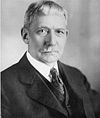
|
| 1913 |
Henri La Fontaine (1854-1943) |
|
President of the Permanent International Peace Bureau |

|
| 1914 | not awarded | |||
| 1915 | ||||
| 1916 | ||||
| 1917 |
International Committee of the Red Cross (founded 1863) |
Based in Geneva, Switzerland |
campaigned for prisoners of war and wounded as well as the respect of the Geneva Convention during the First World War |

|
| 1918 | not awarded | |||
| 1919 |
Woodrow Wilson (1856-1924) (awarded 1920) |
|
Mediation efforts to end the First World War. Initiated the founding of the League of Nations |

|
1920s
| year | person | country | Reason for awarding the prize | image |
|---|---|---|---|---|
| 1920 |
Léon Bourgeois (1851-1925) |
|
President of the Council of the League of Nations |

|
| 1921 |
Hjalmar Branting (1860-1925) |
|
Swedish delegate to the Council of the League of Nations |

|
|
Christian Lous Lange (1869–1938) |
|
Secretary General of the Inter-Parliamentary Union |
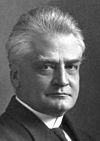
|
|
| 1922 |
Fridtjof Nansen (1861–1930) |
|
Inventor of the Nansen pass for refugees |
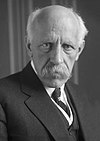
|
| 1923 | not awarded | |||
| 1924 | ||||
| 1925 |
Austen Chamberlain (1863–1937) (awarded 1926) |
|
Negotiating partner for the Locarno Treaty |

|
|
Charles Gates Dawes (1865–1951) (awarded 1926) |
|
Founder of the Dawes Plan |

|
|
| 1926 |
Aristide Briand (1862-1932) |
|
Co-initiator of the Locarno Treaty and Dawes Plan |

|
|
Gustav Stresemann (1878–1929) |
|
Negotiating partner for the Locarno Treaty |
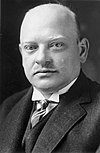
|
|
| 1927 |
Ferdinand Buisson (1841-1932) |
|
Founder and President of the " Ligue des Droits de l'Homme " |
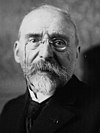
|
|
Ludwig Quidde (1858–1941) |
|
Left-liberal historian and politician. From 1914 to 1929 chairman of the German Peace Society (DFG); Organizer of various international peace conferences |
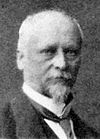
|
|
| 1928 | not awarded | |||
| 1929 |
Frank Billings Kellogg (1856–1937) (awarded 1930) |
|
Negotiating partner of the Briand-Kellogg Pact |
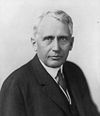
|
1930s
| year | person | country | Reason for awarding the prize | image |
|---|---|---|---|---|
| 1930 |
Nathan Söderblom (1866–1931) |
|
sat in the ecumenical one |

|
| 1931 |
Jane Addams (1860-1935) |
|
President of the Women's International League for Peace and Freedom |
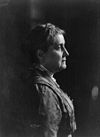
|
|
Nicholas Murray Butler (1862-1947) |
|
sat down for the Kellogg-Briand Pact , a |
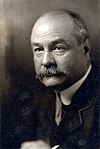
|
|
| 1932 | not awarded | |||
| 1933 |
Norman Angell (1874–1967) (awarded 1934) |
|
Member of the Executive Commission of the League of Nations and the National Peace Council |

|
| 1934 |
Arthur Henderson (1863-1935) |
|
Chairman of the Conference on the Disarmament of the League of Nations (1932–1934) |

|
| 1935 |
Carl von Ossietzky (1889–1938) (awarded 1936) |
|
Pacifist and journalist (the German Reich then forbids its citizens to accept the award) |

|
| 1936 |
Carlos Saavedra Lamas (1878-1959) |
|
President of the League of Nations Assembly and mediator in the conflict between Paraguay and Bolivia (1935) |

|
| 1937 |
Robert Cecil, 1st Viscount Cecil of Chelwood (1864-1958) |
|
Founder and President of the International Peace Campaign |
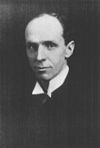
|
| 1938 |
Office international Nansen pour les réfugiés (1930–1939) |
Based in Geneva, Switzerland |
International Nansen Office for Refugees | |
| 1939 | not awarded | |||
1940s
| year | person | country | Reason for awarding the prize | image |
|---|---|---|---|---|
| 1940 | not awarded | |||
| 1941 | ||||
| 1942 | ||||
| 1943 | ||||
| 1944 |
International Committee of the Red Cross (founded 1863) (awarded 1945) |
|
campaigned for prisoners of war and wounded soldiers as well as for the inmates of the German concentration camps and for the civilian population during the Second World War |

|
| 1945 |
Cordell Hull (1871-1955) |
|
Co-founder of the United Nations |

|
| 1946 |
Emily Greene Balch (1867-1961) |
|
President of the " Women's International League for Peace and Freedom " |

|
|
John Raleigh Mott (1865–1955) |
|
Chairman of the " International Missionary Council " and President of the "World Alliance of Young Men's Christian Associations" ( YMCA ), as well as founding general secretary of the World Christian Student Union ( WSCF ) |

|
|
| 1947 | The Friends Service Council |
|
The two Quaker organizations were honored on behalf of the Quaker's auxiliary work. |
 
|
| American Friends Service Committee |
|
|||
| 1948 | not awarded | |||
| 1949 |
John Boyd Orr (1880-1971) |
(born in Kilmaurs , Scotland ) |
Organizer and director of the Organization for Food and Agriculture (General Food and Agricultural Organization), President of the National Peace Council (National Peace Council) and the World Union of Peace Organizations (World Union of Peace Organizations) |

|
1950s
| year | person | country | Reason for awarding the prize | image |
|---|---|---|---|---|
| 1950 |
Ralph Bunche (1904–1971) |
|
Mediator in the Middle East Conflict (1948) |

|
| 1951 |
Léon Jouhaux (1879–1954) |
|
Trade unionists |

|
| 1952 |
Albert Schweitzer (1875–1965) (awarded 1953) |
(born in Kaysersberg , then Germany ) |
Founder of the Tropical Hospital in Lambaréné , French Equatorial Africa (now Gabon ) |

|
| 1953 |
George C. Marshall (1880-1959) |
|
Founder of the Marshall Plan |

|
| 1954 |
United Nations High Commissioner for Refugees (founded 1951) (awarded 1955) |
Based in Geneva, Switzerland |
United Nations Refugee Agency |
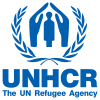
|
| 1955 | not awarded | |||
| 1956 | ||||
| 1957 |
Lester Pearson (1897-1972) |
|
Former Canadian Foreign Minister and President of the United Nations General Assembly |

|
| 1958 |
Georges Pire (1910-1969) |
|
Head of the refugee aid organization " L'Europe du Coeur au Service du Monde " |

|
| 1959 |
Philip Noel-Baker (1889-1982) |
|
Commitment to international peace |

|
1960s
| year | person | country | Reason for awarding the prize | image |
|---|---|---|---|---|
| 1960 |
Albert John Luthuli (1898–1967) (awarded 1961) |
(born in Bulawayo , today Zimbabwe ) |
President of the South African liberation movement African National Congress (ANC) |

|
| 1961 |
Dag Hammarskjöld (1905–1961) (posthumous) |
|
Secretary General of the United Nations |
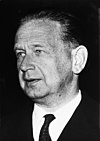
|
| 1962 |
Linus Pauling (1901–1994) (awarded 1963) |
|
campaigned for an end to nuclear tests |
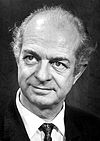
|
| 1963 |
International Committee of the Red Cross (founded 1863) |
Based in Geneva, Switzerland |
was involved in the war for the wounded and prisoners of war as well as for the dissemination of the Geneva Conventions |

|
|
League of Red Cross Societies (founded 1919) |
Based in Geneva, Switzerland |
Aid to refugees in peacetime and for victims of natural disasters |

|
|
| 1964 |
Martin Luther King (1929–1968) |
|
Black rights advocate in the US and around the world |
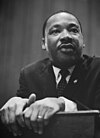
|
| 1965 |
United Nations Children's Fund (UNICEF) (founded 1946) |
Based in New York, United States | United Nations Children's Fund |

|
| 1966 | not awarded | |||
| 1967 | ||||
| 1968 |
René Cassin (1887–1976) |
|
President of the European Court of Human Rights |

|
| 1969 | International Labor Organization (ILO, founded 1919) | Based in Geneva, Switzerland |
Successful work for better working conditions since 1919 |

|
1970s
| year | person | country | Reason for awarding the prize | image |
|---|---|---|---|---|
| 1970 |
Norman Borlaug (1914-2009) |
|
Work to improve agriculture |

|
| 1971 |
Willy Brandt (1913–1992) |
|
campaigned for peace with the Eastern Bloc and reconciliation with countries formerly occupied by the Third Reich |

|
| 1972 | not awarded | |||
| 1973 |
Henry Kissinger (* 1923) |
(born in Fürth , Germany ) |
negotiated the Paris Treaty , which regulated the United States' exit from the Vietnam War. Lê Đức Thọ did not accept the price. |
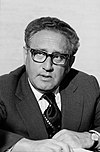
|
|
Lê Đức Thọ (1911–1990) |
|

|
||
| 1974 |
Seán MacBride (1904–1988) |
(born in Paris , France ) |
President of the International Peace Bureau, Geneva, President of the UN Commission for Namibia |

|
|
Eisaku Satō (1901-1975) |
|
former Japanese Prime Minister, for fighting the proliferation of nuclear weapons |

|
|
| 1975 |
Andrei Dmitrijewitsch Sakharov (1921–1989) |
|
Human rights activist in the USSR |
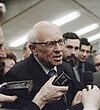
|
| 1976 |
Betty Williams (1943-2020) (awarded 1977) |
|
Founders of the "Northern Ireland Peace Movement" (renamed "Community of Peace People") |

|
|
Mairead Corrigan (* 1944) |
|
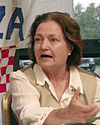
|
||
| 1977 |
Amnesty International (founded in 1961) |
|
campaigned for political prisoners |
|
| 1978 |
Anwar as-Sadat (1918-1981) |
|
initiated the peace treaty between Egypt and Israel |
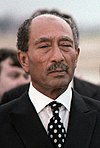
|
|
Menachem Begin (1913-1992) |
(born in Brest , then Russia , now Belarus ) |
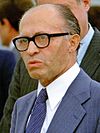
|
||
| 1979 |
Mother Teresa (1910-1997) |
(born in Üsküb , Ottoman Empire , today Skopje, North Macedonia ) |
Founder of the Order of Missionaries of Charity |

|
1980s
| year | person | country | Reason for awarding the prize | image |
|---|---|---|---|---|
| 1980 |
Adolfo Pérez Esquivel (* 1931) |
|
Human rights activist |

|
| 1981 |
United Nations High Commissioner for Refugees (founded 1951) |
Based in Geneva , Switzerland |
United Nations Refugee Agency |

|
| 1982 |
Alva Myrdal (1902-1986) |
|
Diplomat and delegate of the UN disarmament conferences |
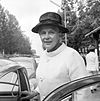
|
|
Alfonso García Robles (1911-1991) |
|
Permanent representative at the Geneva disarmament negotiations, member of the UN Special Conference on Disarmament |
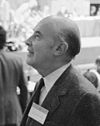
|
|
| 1983 |
Lech Wałęsa (* 1943) |
|
Founder of the Polish trade union and human rights movement Solidarność ("Solidarity") |

|
| 1984 |
Desmond Tutu (* 1931) |
|
contributed to ending apartheid in South Africa |

|
| 1985 |
International Physicians for the Prevention of Nuclear War (IPPNW) (founded 1980) |
Based in Somerville , United States |
International Doctors for the Prevention of Nuclear War |

|
| 1986 |
Elie Wiesel (1928-2016) |
(born in Sighet , Romania ) |
American writer, Holocaust survivor, fought against oppression, violence and racism |

|
| 1987 |
Óscar Arias Sánchez (* 1940) |
|
"For his work for peace in Central America, efforts that led to the agreement that was signed in Guatemala on August 7th of that year " |

|
| 1988 |
United Nations Peacekeeping Forces (founded 1948) |
Based in New York , United States |
Peace operations on behalf of the United Nations in crisis areas (worldwide) |

|
| 1989 |
Tenzin Gyatso (14th Dalai Lama ) (* 1935) |
|
supports a demilitarized Tibet and the self-determination of the Tibetans |
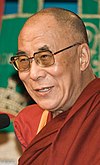
|
1990s
| year | person | country | Reason for awarding the prize | image |
|---|---|---|---|---|
| 1990 |
Mikhail Gorbachev (* 1931) |
|
"For his leading role in the peace process that characterizes important parts of the international community today" |

|
| 1991 |
Aung San Suu Kyi (* 1945) |
|
"For their commitment to human rights" |

|
| 1992 |
Rigoberta Menchú (* 1959) |
|
"For their commitment to human rights, especially of indigenous peoples" |

|
| 1993 |
Nelson Mandela (1918-2013) |
|
"For their contribution to ending apartheid in South Africa" |

|
|
Frederik Willem de Klerk (1936-2021) |
|

|
||
| 1994 |
Yasser Arafat (1929-2004) |
(born in Cairo , Egypt ) |
"For their efforts to resolve the Middle East conflict" |

|
|
Shimon Peres (1923-2016) |
(born in Wiszniewo , Poland ) |

|
||
|
Yitzchak Rabin (1922–1995) |
|
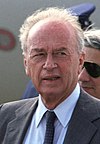
|
||
| 1995 |
Józef Rotblat (1908-2005) |
(born in Warsaw , Poland ) |
"For their efforts to reduce the role of nuclear weapons in international politics" |

|
|
Pugwash Conferences on Science and World Affairs (since 1957) |
|

|
||
| 1996 |
Carlos Filipe Ximenes Belo (* 1948) |
|
"For your efforts to find a peaceful solution to the East Timor conflict" |

|
|
José Ramos-Horta (* 1949) |
|

|
||
| 1997 |
International Campaign to Ban Landmines (founded 1995) |
Based in Geneva, Switzerland |
"For their efforts to outlaw mines directed against people internationally" |

|
|
Jody Williams (born 1950) |
|

|
||
| 1998 |
John Hume (1937-2020) |
|
"For your efforts to find a peaceful solution to the Northern Ireland conflict" |

|
|
David Trimble (born 1944) |
|

|
||
| 1999 |
Doctors Without Borders (Médecins sans Frontières) (founded in 1971) |
Based in Geneva, Switzerland |
"In recognition of their humanitarian pioneering work on several continents" |

|
2000s
| year | person | country | Reason for awarding the prize | image |
|---|---|---|---|---|
| 2000 |
Kim Dae-jung (1925-2009) |
|
"For his contributions to the understanding between South Korea and North Korea" |

|
| 2001 |
United Nations (founded in 1945) |
Based in New York, United States |
"For their commitment to a more organized and peaceful world" |

|
|
Kofi Annan (1938-2018) |
|

|
||
| 2002 |
Jimmy Carter (born 1924) |
|
"For his many years of contributions to the solution of international conflicts and to the promotion of democracy and human rights" |

|
| 2003 |
Shirin Ebadi (* 1947) |
|
"For their commitment to democracy and human rights" |

|
| 2004 |
Wangari Maathai (1940-2011) |
|
"For their contribution to sustainable development, democracy and peace" |

|
| 2005 |
International Atomic Energy Agency (IAEA) (founded 1957) |
Based in Vienna, Austria |
"For their use against the military misuse of atomic energy as well as for the safe use of atomic energy for civil purposes" |

|
|
Mohammed el-Baradei (* 1942) |
|

|
||
| 2006 |
Muhammad Yunus (* 1940) |
|
"For the promotion of economic and social development from below" |
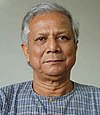
|
|
Grameen Bank (founded 1983) |
|

|
||
| 2007 |
Intergovernmental Panel on Climate Change (IPCC) (founded in 1988) |
Based in Geneva, Switzerland |
"For their efforts to develop and disseminate a better understanding of man-made climate change and for laying the foundations for action against climate change" |

|
|
Al Gore (born 1948) |
|

|
||
| 2008 |
Martti Ahtisaari (* 1937) |
|
"For his important efforts to solve international conflicts on different continents and over three decades" |

|
| 2009 |
Barack Obama (* 1961) |
|
"For his extraordinary efforts to strengthen international diplomacy and cooperation between peoples" |

|
2010s
| year | person | country | Reason for awarding the prize | image |
|---|---|---|---|---|
| 2010 |
Liu Xiaobo (1955-2017) |
|
"For his long and non-violent struggle for basic human rights in China" | |
| 2011 |
Ellen Johnson Sirleaf (* 1938) |
|
"For their non-violent struggle for the safety of women and for the right of women to participate fully in peace-building work" |
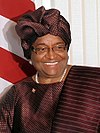
|
|
Leymah Gbowee (born 1972) |
|

|
||
|
Tawakkol Karman (* 1979) |
|
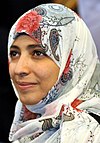
|
||
| 2012 |
European Union (founded in 1952 or 1993) |
Based in Brussels, Belgium |
"For over six decades that contributed to the development of peace and reconciliation, democracy and human rights in Europe" |

|
| 2013 |
Organization for the Prohibition of Chemical Weapons (OPCW) (founded 1997) |
Based in The Hague, the Netherlands |
"For their extensive efforts to dispose of chemical weapons" |
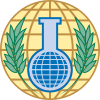
|
| 2014 |
Kailash Satyarthi (* 1954) |
|
"For their fight against the oppression of children and young people and for the right of all children to education" |
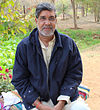
|
|
Malala Yousafzai (* 1997) |
|

|
||
| 2015 |
Quartet du dialogue national (founded 2013) |
|
"For his decisive contribution to building a pluralistic democracy in Tunisia as a result of the Jasmine Revolution of 2011" |

|
| 2016 |
Juan Manuel Santos (* 1951) |
|
"For his determined efforts to end the more than 50 years of civil war in the country " |

|
| 2017 |
International Campaign to Abolish Nuclear Weapons (ICAN) (founded 2007) |
Based in Geneva, Switzerland |
"For her work in drawing attention to the catastrophic humanitarian consequences of nuclear weapons and for her pioneering efforts to achieve a treaty ban on such weapons" |
|
| 2018 |
Denis Mukwege (* 1955) |
|
"For their use against sexual violence as a weapon in wars and armed conflicts" |

|
|
Nadia Murad (* 1993) |
|

|
||
| 2019 |
Abiy Ahmed (* 1976) |
|
"For his efforts towards peace and international cooperation and especially for his determined initiative to resolve the border conflict with neighboring Eritrea" |
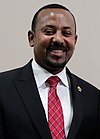
|
2020s
| year | person | country | Reason for awarding the prize | image |
|---|---|---|---|---|
| 2020 |
United Nations World Food Program (WFP) (founded in 1961) |
Based in Rome , Italy |
"For efforts to combat hunger, for helping to improve conditions for peace in conflict-affected areas and as a driving force in efforts to prevent hunger as a weapon for war and conflict" |

|
| 2021 |
Maria Ressa (* 1963) |
|
"For their efforts to uphold freedom of expression, which is a prerequisite for democracy and lasting peace" |

|
|
Dmitri Muratow (* 1961) |
|

|
| 1900 • 1910 • 1920 • 1930 • 1940 • 1950 • 1960 • 1970 • 1980 • 1990 • 2000 • 2010 • 2020 |
Distribution according to nationalities
| nation | Number of awards |
|---|---|
| (International) organizations | 23 |
|
|
21 |
|
including Northern Ireland |
12 4 |
|
|
9 |
|
|
5 |
|
|
4 each |
|
|
|
|
|
3 each |
|
|
|
|
|
|
|
|
2 each |
|
|
|
|
|
|
|
|
|
|
|
|
|
|
|
|
|
|
|
|
|
|
|
|
|
|
1 each |
|
|
|
|
|
|
|
|
|
|
|
|
|
|
|
|
|
|
|
|
|
|
|
|
|
|
|
|
|
|
|
|
|
|
|
|
|
|
|
|
|
|
|
|
|
|
|
|
|
|
|
|
|
|
|
|
|
|
|
|
|
|
|
|
|
|
|
|
|
|
|
|
|
|
|
|
|
|
|
|
|
|
|
Web links
- The Nobel Peace Prize (Official Site )
- The Nobel Peace Prize at the Nobel e-Museum (English)
- List of Nobel Peace Prize (English)
- Information from the German Historical Museum on the Nobel Peace Prize
Individual evidence
The data on the winners correspond to the information on the official website of the Nobel Prize Foundation.
- ↑ a b c d e f g h i j k l m country according to the information on nobelprize.org. The country may differ from the nationality of the laureate.
- ↑ a b c d e f g h The prize money was given to the funds of this prize category.
- ↑ http://www.nobelprize.org/ : 1925 , [1] ; last viewed on Feb. 5, 2013
- ↑ http://www.nobelprize.org/ : 1925 , [2] ; last viewed on Feb. 5, 2013
- ↑ a b c One third of the prize money was given to the main fund and two thirds to the funds in this prize category.
- ↑ An award was rejected because there was no “suitable living candidate”. Mahatma Gandhi was nominated, but a few days before the nomination deadline he was shot. An initially considered posthumous award was then waived for various reasons. Øyvind Tønnesson: "Mahatma Gandhi, the Missing Laureate" on nobelprize.org
- ↑ Why Le Duc Tho refused his Nobel Peace Prize. Transcription of the letter from Lê Đức Thọ about the rejection of the Nobel Prize (unofficial translation by the New York Times ). In: Black and White Cat. December 11, 2010; Archived from the original on January 1, 2011 ; accessed on April 15, 2015 .
- ↑ a b c d Northern Ireland is mentioned in the official lists of the Nobel Peace Prize, but the United Kingdom is mentioned in the official lists of the entire Nobel Prize.
- ↑ Information from the official lists of the Nobel Foundation. Mother Teresa came from an Albanian family and grew up in Macedonia , Serbia, from 1912 , but spent most of her life in India and in 1948 took on Indian citizenship. This is why she is also listed as an Indian on the lists.
- ↑ This information can be found in the official lists of Nobel institutions, but is controversial. Tendzin Gyatsho was born in an independent Tibet, but at the time of the award of the prize this state only existed in the form of a government-in-exile .
- ↑ gates Frängsmyr in Les Prix Nobel 1989, published by the Nobel Foundation
- ↑ This was the first time that the role of environmental protection for world peace was honored.
- ^ Nobel Media AB: International Campaign to Abolish Nuclear Weapons (ICAN) - Facts. November 6, 2017. Retrieved November 6, 2017 .
- ↑ The Nobel Peace Prize 2020 . In: nobelprize.org, October 9, 2020.
- ^ The Nobel Peace Prize 2021 . In: nobelprize.org, October 8, 2021 (accessed October 8, 2021).